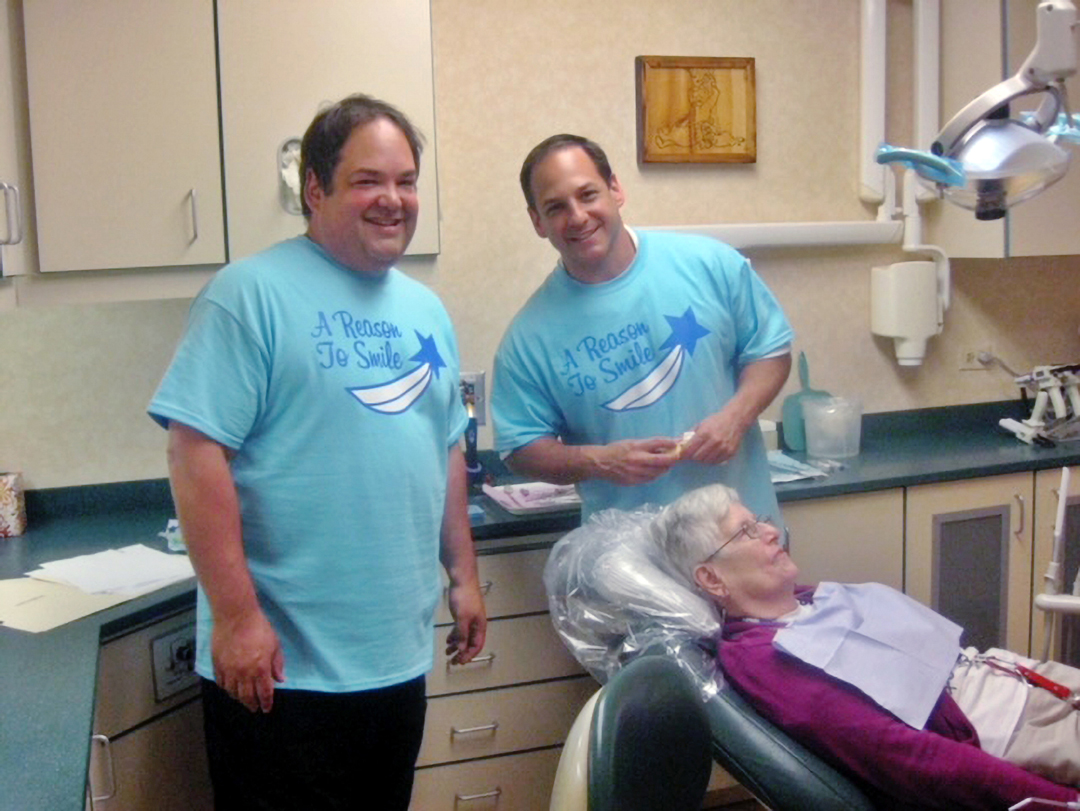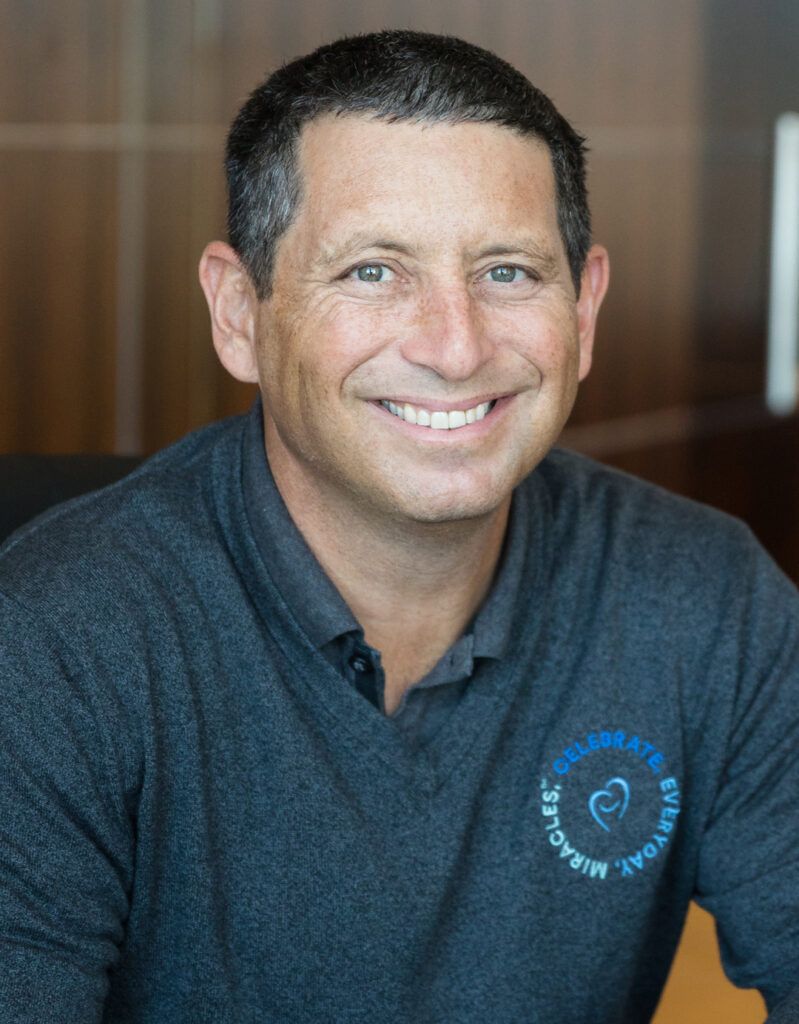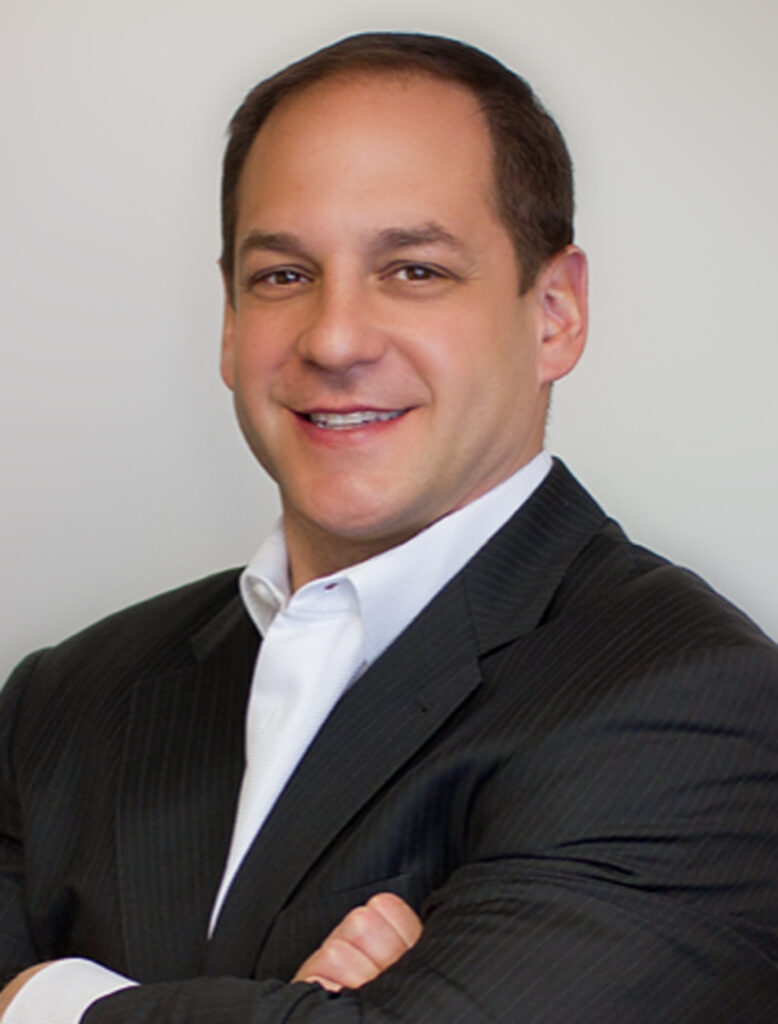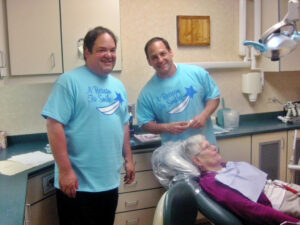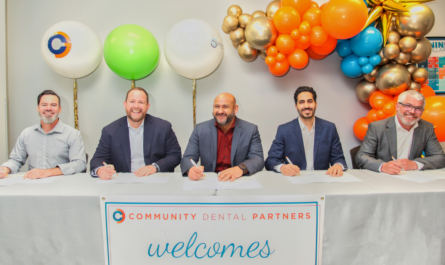For Smile Brands and DecisionOne, growth isn’t about getting bigger. It’s about transformation.
DSOs are skilled in acquiring practices and building new ones. That is to say, they know how to get bigger. But as they grow, do they improve care? Do they increase efficiency, serve more patients, and unite their growing employee base behind a single mission? Do they learn from the practices or DSOs they acquire in order to become something other – or more – than they were before?
Two years after entering their strategic partnership in January 2019, Steve Bilt, CEO of Smile Brands Inc. and Dr. AJ Acierno, CEO of DecisionOne Dental, believe they are going in the right direction. It hasn’t been easy, nor has it always been to the original plan. But they believe that their work prior to the deal and ever since has helped them create a learning organization, ready to grow in numbers, mission and value.
“Dentistry forever has been known to acquire practices,” says Acierno, who founded DecisionOne with his brother, Dr. Mike Acierno, in 2011. “But it can be difficult to form a partnership, because usually, the acquirer says, ‘We know what we’re doing, you do it our way.’” Smile Brands’ and DecisionOne’s approach was different, he says. “A strategic partnership means getting advice and help from somebody who actually went through it before you, so you don’t make the same mistakes. It also involves sharing what you’ve learned and advocating against losing what makes your company special.” It rests on joining an organization whose leaders share a vision, believe in each other’s culture, and accept both.
Bilt met Acierno when both served on the executive board of the Association of Dental Support Organizations. “I saw AJ’s spark and I said, ‘I’d love to be on the journey with you,’” Bilt said at the 2019 Fall Summit sponsored by DEO. “I knew I would learn from him, whether we did a deal or not.” They spent months exploring whether they were right for each other, rather than rushing into a deal and hoping it would be the right fit, he said.
“We knew we needed a culture match, that is, a partner who saw the world the same way as we did, and with the same idea of what it wanted to accomplish,” Bilt says. “That didn’t necessarily mean we did things the same way.”
What’s your ‘why?’
“When AJ and I first got together, we talked about ‘What do we want to do in dentistry?’ There’s this huge opportunity. In 2019, 61% of Americans didn’t go to a dentist. How could we impact that model?” In DecisionOne he saw the potential for a partnership. “They had a different kind of business,” says Bilt. “Two brothers, both very capable, and both wanting to stay with the business and grow it.
“At the time, AJ told us he wanted to build the best company he could and have the biggest impact on changing dentistry for the better. So the deal became about supporting him and his team’s efforts to improve their business, and to offer tools to accelerate their growth – without changing the nature of their entrepreneurial company.”
Says Acierno, “Anybody looking at a partner deal – whether it’s private equity or a strategic partnership – is doing it for a reason.” DecisionOne had a few reasons. “We were trying to build an organization people would want to work for – not have to work for,” he says. “In 2017, we had figured out that the time we were spending on support services was hampering our ability to build something that would achieve that.”
And practically speaking, DecisionOne couldn’t match the support services that Smile Brands had built, he continues. Even if it had been able to catch up to the larger DSO, the latter would have advanced that much further ahead.
Bilt knew that Acierno wanted to grow DecisionOne, but he also knew that Acierno’s mission – to change dentistry – was a big one, and would probably meet with mistakes and missed opportunities. “So we said, ‘We can bring you some of the lessons we’ve learned, so you can amplify your ‘why.’ Everybody has a ‘why’, which is what they want to accomplish.”
Mutual learning
I never took a business class,” says Acierno. “For me, ‘scaling up’ meant working more hours. I thought, ‘If I work 14 hours now, I can scale up by working a few more hours a day.’
“I need to learn as much as possible. And when you sit down with someone like Steve, who had 400 successful offices at the time, I decided, if they want to teach me something, I’ll open my ears and listen.”
The listening went two ways. Says Bilt, “I learned early on, I’m never as good as they say when I’m on top, and I’m not as bad as they say when I’m on the bottom. We recognized that when AJ and the DecisionOne team looked at an acquisition or partnership, they approached it in a very detailed way, which, candidly, was beyond what [Smile Brands] did. Now our handbook on due diligence and integration is an adaption of theirs.”
Organizations and dental practices are rarely totally great or totally awful, he continues. They may be broken in some areas but excel in others. “If we’re going to acquire a practice or company, the first thing I do is ask their team to tell me all the things they’re doing that are right and that they don’t want me to change. Then I ask for three or four things that need changing. And they usually know exactly what those are.”
The zig and the zag
Bilt and Acierno agree that in a successful combination, both companies must be open to change.
“You have to be completely open to learning from the entity you quote-unquote acquire,” says Bilt. “And that entity has to be open to learning from you. Both of you have to be open to learning a third way – maybe it’s a hybrid of the two, or something different altogether.
“I am fond of the saying, ‘The first casualty of battle is the plan,’” he continues. “We certainly didn’t envision COVID-19 when we went into this deal. But as a business, you have to zig and zag. What’s most important is that you and your partner see the world the same way insofar as what you want to accomplish, so together you can navigate the unexpected.
“It’s a bit like a marriage. A lot of times, people get disappointed if things don’t turn out as planned. But what you signed up for was to put your purposes together and figure things out as you go. AJ and his team have been really great about that.”
Smile Brands has been changing as well. Historically the company’s footprint consisted primarily of larger, multispecialty practices, says Bilt. DecisionOne, on the other hand, was weighted toward smaller independent practices.
“That wasn’t our model,” says Bilt. “But did that mean we couldn’t do a deal with AJ? No. It meant we needed to have a vested partner with whom, over time, we could find ways to create value. And it helped us redefine our value proposition – what we really wanted to do. It wasn’t simply to operate large, multispecialty practices. It was to attract and retain great doctors, and provide them with great support.” Partnering with DecisionOne was a learning experience, and it prepared Smile Brands for its December 2020 acquisition of Midwest Dental.
“Dentistry is a tough business,” says Acierno. “Much of our business relies on one or two individuals in a dental office – the doctors. These are people with a unique skill set. When you’re partnering or acquiring, not only are you partnering with the DSO, but with every single doctor, hygienist and front desk person, too.”
Through it all, successful consolidation relies on people’s openness to change – and the skill of their leaders to guide them through it, says Bilt. “People have to be open to the fact that we’re always changing anyway – all the time,” he says. “Don’t wax poetic about the ‘good old days’ and use that as an excuse not to lean in to create the future. “Change is going to happen – and it will run by you if you let it. Open-mindedness and willingness to change and grow made you successful before you partnered with others. And it will make you successful after.”


